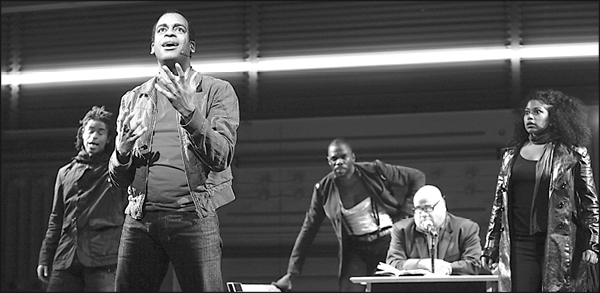by Scott Harrah
PASSING STRANGE Directed by Annie Dorsen
Belasco Theater
111 W. 44th Street
(212-239-6200;
“Passing Strange,” the new rock musical that recently transferred to Broadway after a successful run at the Public Theater, does not break the same theatrical ground as “Spring Awakening” and “Rent,” because it lacks the infectious scores and compelling stories that made those shows instant classics for the “twenty-something” crowd. It’s ultra-hip, features a live rock band onstage, and the plot centers on the romantic glory of discontented youth. The play often lacks thematic focus, however, and its songs are ear-splittingly shrill, as well as uninspired.
This is more of a rock concert with a serviceable narrative than a full-fledged Broadway musical. What worked so well as a musical fringe-theater piece at the Public is not as powerful on Broadway, with such a hefty ticket price. In essence, “Passing Strange” is a rock and roll travelogue about a young African-American man who takes us on a journey from South Central L.A. to Amsterdam, Berlin, and back. The narrator, Stew, stands peering out at the audience through dark sunglasses as he tells a tale about a man simply named “Youth” (played with aplomb by Daniel Breaker). He is constantly rebelling against his churchgoing mother (the remarkable Elsa Davis, giving the show’s most poignant performance). The teenager hates going to church—he’s more interested in Zen Buddhism than Christianity—and balks at nearly everything his mother asks him to do. After much prodding from his mother, along with the flirtations of an attractive choirgirl (the spunky De’Adre Aziza), Youth reluctantly joins the church choir
The show’s opening scenes, set in Los Angeles, are the most dramatically satisfying and possess remarkable moments of musical theater. The song “Baptist Fashion Show,” with Elsa Davis and her circle of hat-wearing, chic church ladies, features the sort of razzle-dazzle choreography and sassy lyrics that are surefire crowd-pleasers. Colman Domingo, as the fey, flamboyant choir director Franklin, is an absolute delight, rattling off one hilariously bitchy bon mot after another.
The youngster finds his calling in music and goes on a journey of self-discovery, heading to Europe to find himself, because he believes L.A. is “death row with palm trees.” He first travels to Amsterdam and befriends a group of pot-smoking hippies, all of whom are interested in his gifts as a musician, impressed by his repertoire of blues, jazz, and rock. The beautiful Marianna (a dual role played by De’Adre Aziza) is so smitten with the guy she gives him the keys to her apartment and they start a whirlwind relationship of sex, drugs, and rock and roll. Tunes such as “Keys,” “We Just Had Sex” and “Stoned” are typical 1970s-style rock, but all three lack the distinction and lyrical verve that elevated songs from “Spring Awakening” and “Rent” to anthems. To those under 25, the twangy guitars and syncopated percussion may sound hip, but for most Broadway audiences, the songs will simply sound like ambient noise devoid of melody. Perhaps that is why Stew, the narrator, mentions at one point that he doesn’t know how to write show tunes. “Passing Strange” is certainly not trying to be a Rodgers and Hammerstein-style show or an Andrew Lloyd Weber rock opera.
Things start unraveling during the second act as the young man breaks off his relationship with Marianna and moves to Berlin. He hangs out with Hugo (Chad Goodridge), a militant essayist, Mr. Venus (Colman Domingo), a performance artist, and filmmaker Sudabey (De’Andre Aziza once again), a woman who makes “porno” films showing businessmen making deals (please, don’t ask). Between the affected German accents, nonsensical psychobabble about politics and capitalism—and high-decibel songs such as “Surface” and “Come Down Now”—it’s hard for one to know what’s really happening onstage at this point. But what follows is fairly predictable. Without giving away too much of the plot, suffice it to say that the boy from California realizes that his mother’s homilies about life weren’t so far-fetched after all, and Berlin is much more of a “death row” than L.A. ever will be.
What manages to sustain one’s interest throughout “Passing Strange” is the solid narrative about the mother and son’s relationship. One of the show’s final scenes—depicting the two on an emotional long-distance phone call—is heartbreaking indeed. “Passing Strange” dares to take Broadway out of the proverbial box with its edginess, and luckily there is enough good acting, especially from Daniel Breaker and Elsa Davis, to give the show some veritable substance.






































